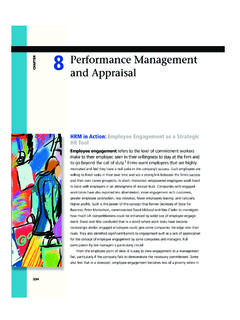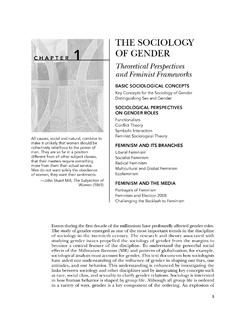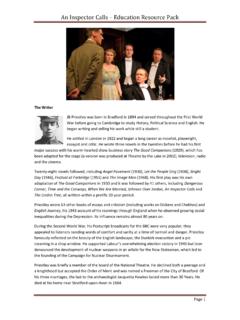Transcription of INTRODUCTION TO QUALITATIVE METHODS IN …
1 INTRODUCTION TOQUALITATIVE METHODS IN PSYCHOLOGYD ennis HowittLoughborough UniversityPearson Education LimitedEdinburgh GateHarlowEssex CM20 2 JEEnglandand Associated Companies throughout the worldVisit us on the World Wide Web published 2010 Second edition published 2010 Pearson Education Limited 2010 The right of Dennis Howitt to be identified as author of this work has been asserted by him in accordance with the Copyright, Designs and Patens Act rights reserved. No part of this publication may be reproduced, stored in a retrieval system, or transmitted in any from or by any means, electronic, mechanical, photocopying, recording or otherwise, without either the prior written permission of the publisher or a licence permitting restricted copying in the United Kingdom issued by the Copyright Licensing Agency Ltd, Saffron House, 6 10 Kirby Street, London EC1N trademarks used herein are the property of their respective owners.
2 The use of any trademark in this text does not vest in the author or publisher any trademark ownership rights in such trademarks, nor does the use of such trademarks imply any affiliation with or endorsement of this book by such : 978-0-13-206874-1 British Library Cataloguing-in-Publication DataA catalogue record for this book is available from the British LibraryLibrary of Congress Cataloging-in-Publication Data[delete this if CIP data has not been applied for][insert book block when received form LoC]1098765432114 13 12 11 10 Typeset in 10 Sabon by 35 Printed by Ashford Colour Press Ltd., Gosport, UKThe publisher s policy is to use paper manufactured from sustainable CONTENTSC ontentsviiGuided tour of the bookxiiPrefacexivAcknowledgementsxviiiPa rt 1 Background to QUALITATIVE METHODS in psychology11 What is QUALITATIVE research in psychology and was it really hidden?
3 52 How QUALITATIVE METHODS developed in psychology28 Part 2 QUALITATIVE data collection553 QUALITATIVE interviewing574 Focus groups895 Ethnography/participant observation111 Part 3 QUALITATIVE data analysis1356 Data transcription methods1397 Thematic analysis1638 QUALITATIVE data analysis: Grounded theory development1879 Discourse analysis21510 Conversation analysis24411 Interpretative phenomenological analysis (IPA)27112 Narrative analysis296 Part 4 Planning and writing up QUALITATIVE data research32113 Writing a QUALITATIVE report32314 Ensuring quality in QUALITATIVE research35615 Ethics and data management in QUALITATIVE research382 Glossary411 References432 Index450 CONTENTSG uided tour of the bookxiiPrefacexivAcknowledgementsxviiiPa rt 1 Background to QUALITATIVE METHODS in psychology11 What is QUALITATIVE research in psychology and was it really hidden?
4 5 Overview5 What is QUALITATIVE research?6 Science as normal practice in QUALITATIVE and quantitative research10 The beginnings of modern psychology: introspectionism13 The logical positivists, behaviourism and psychology15 The quantitative dominance of mainstream psychology18 Statistics and the quantitative ethos in psychology22 Conclusion25 Key points27 Additional resources272 How QUALITATIVE METHODS developed in psychology28 Overview28 Documenting the growth of QUALITATIVE METHODS in psychology29 The main QUALITATIVE METHODS in psychology up to the 1950s35 The radical innovations of 1950 197042 The recent history of QUALITATIVE psychology49 Conclusion51 Key points53 Additional resources54 Part 2 QUALITATIVE data collection553 QUALITATIVE interviewing57 Overview57 What is QUALITATIVE interviewing?58 The development of QUALITATIVE interviewing62 How to conduct QUALITATIVE interviews64 How to analyse a QUALITATIVE interview81 When to use QUALITATIVE interviews83viiiCONTENTSE valuation of QUALITATIVE interviewing85 Conclusion87 Key points88 Additional resources884 Focus groups89 Overview89 What are focus groups?
5 90 The development of focus groups92 How to conduct focus groups94 How to analyse data from focus groups105 When to use focus groups107 Evaluation of focus groups108 Conclusion109 Key points110 Additional resources1105 Ethnography/participant observation111 Overview111 What is ethnography/participant observation?112 The development of ethnography/participant observation116 How to conduct ethnography/participant observation122 How to analyse ethnography/participant observation127 When to use ethnography/participant observation130 Evaluation of ethnography/participant observation130 Conclusion132 Key points132 Additional resources133 Part 3 QUALITATIVE data analysis1356 Data transcription methods139 Overview139 What is transcription?140 The development of transcription149 How to do Jefferson transcription150 When to use Jefferson transcription157 Evaluation of Jefferson transcription158 Conclusion159 Key points161 Additional resources1627 Thematic analysis163 Overview163 What is thematic analysis?
6 164 The development of thematic analysis168 How to do thematic analysis170 When to use thematic analysis182 Evaluation of thematic analysis183 Conclusion184 Key points185 Additional resources1868 QUALITATIVE data analysis: Grounded theory development187 Overview187 What is grounded theory?188 The development of grounded theory192 How to do grounded theory195 When to use grounded theory207 Evaluation of grounded theory208 Conclusion213 Key points214 Additional resources2149 Discourse analysis215 Overview215 What is discourse analysis?216 The development of discourse analysis222 How to do discourse analysis226 When to use discourse analysis239 Evaluation of discourse analysis240 Conclusion242 Key points242 Additional resources24310 Conversation analysis244 Overview244 What is conversation analysis?245 The development of conversation analysis253 How to do conversation analysis255 When to use conversation analysis267 Evaluation of conversation analysis268 Conclusion269 Key points270 Additional resources270 CONTENTSixxCONTENTS11 Interpretative phenomenological analysis (IPA)271 Overview271 What is interpretative phenomenological analysis?
7 272 The development of interpretative phenomenological analysis277 How to do interpretative phenomenological analysis282 When to use interpretative phenomenological analysis291 Evaluation of interpretative phenomenological analysis292 Conclusion293 Key points294 Additional resources29512 Narrative analysis296 Overview296 What is narrative analysis?297 The development of narrative analysis302 How to do narrative analysis306 When to use narrative analysis316 Evaluation of narrative analysis317 Conclusion318 Key points320 Additional resources320 Part 4 Planning and writing up QUALITATIVE data research32113 Writing a QUALITATIVE report323 Overview323Is a QUALITATIVE research report different?325 Where to aim: the overall characteristics of a good QUALITATIVE report327 The QUALITATIVE ethos328 The structure of a QUALITATIVE report331 The QUALITATIVE report in detail335 Conclusion354 Key points355 Additional resources35514 Ensuring quality in QUALITATIVE research356 Overview356 How should QUALITATIVE research be evaluated?
8 357 Some quality criteria for quantitative research360 Evaluating quality in QUALITATIVE research360 General academic justification and features of the research362 Validity in QUALITATIVE research366 Reliability in QUALITATIVE research379 Conclusion380 Key points381 Additional resources38115 Ethics and data management in QUALITATIVE research382 Overview382 Does QUALITATIVE research need ethics?383 The development of ethics in psychology384 General ethical principles for QUALITATIVE research387 Ethical procedures in QUALITATIVE research390 Debriefing as ethics and methodology404 The ethics of report writing and publication405 Conclusion409 Key points410 Additional resources410 Glossary411 References432 Index450 CONTENTSxiPREFACEIn psychology, the received understanding holds that QUALITATIVE METHODS haveemerged in force during the last three decades.
9 Before this time, mainstreampsychology was a quantitative monolith smothering any other perspective onwhat psychology should be. This is not entirely a fiction but it is a creation mythrather than a precise and historical accurate account of the dark days beforequalitative psychology. Probably my experience is a little different from that ofmost psychologists. At the end of my first year as a psychology student, alongwith my peers, I was sent for six months to the factory floor (and eventually thepersonnel offices) of Morganite Carbon which was then in Battersea, reason? Essentially to experience life as a factory worker and to write a pro-ject on my experiences. In other words, participant observationor ethnography and the experience of real life. At the end of every couple of terms we weresent to other locations.
10 I spent six months at the prison in Wakefield and anothersix months at St George s Hospital, London. At Wakefield, I did my first studyof sex offenders (possibly the first ever study by a psychologist of sex offendersin the United Kingdom). This was an interest which was to resurface years laterwith my studies of sexual abuse and paedophiles. At St George s Hospital my colleagues included Fay Fransella an important figure in the field of GeorgeKelly s personal construct theory an early precursor of social constructionistapproaches in QUALITATIVE psychology. Indeed, I attended the first conference onpersonal construct theory while at Brunel University and, I am assured thoughcannot vouchsafe it, so was in the presence of George Kelly himself. Actuallywe got rather a lot of personal construct Brunel, I remember being fascinated by the sessions on psychoanalysisgiven to us by Professor Elliot Jacques.










